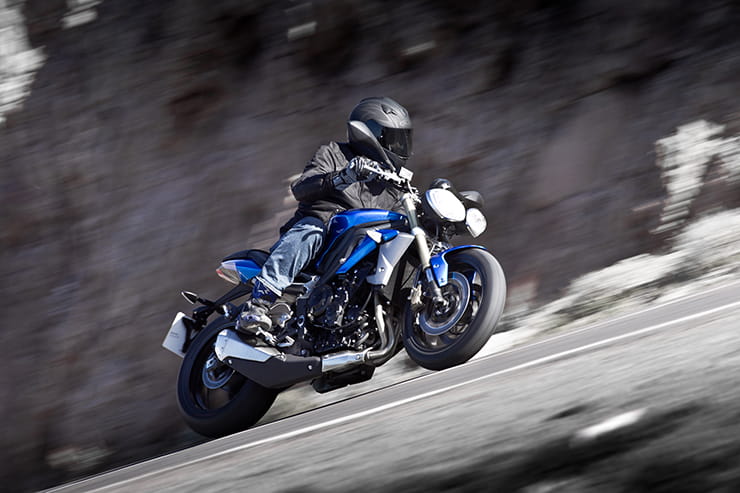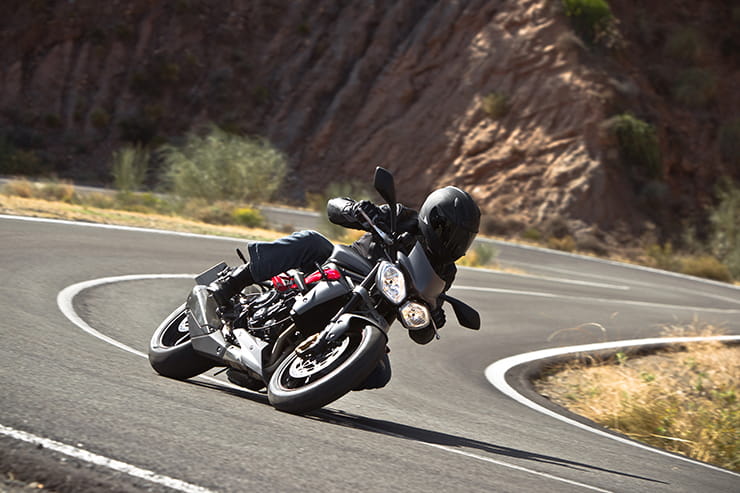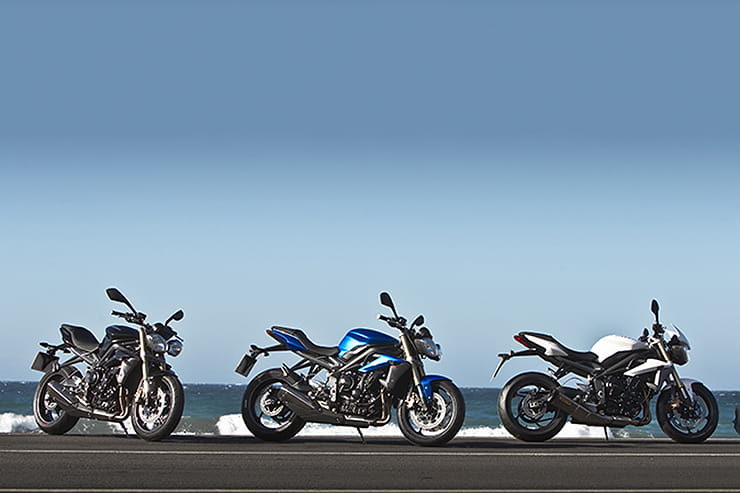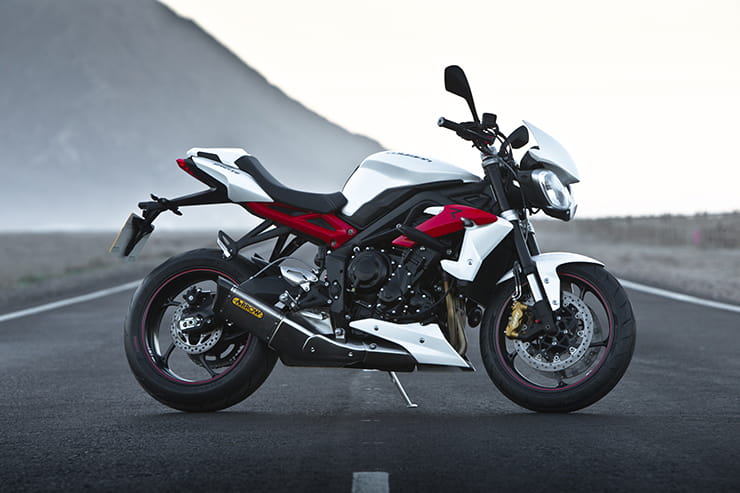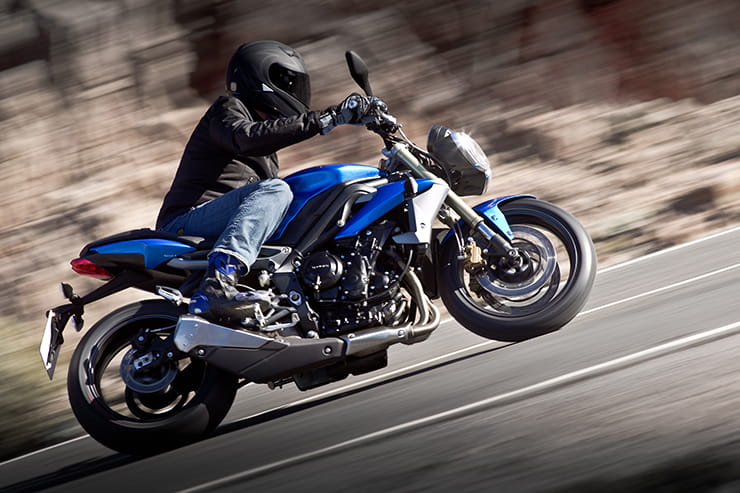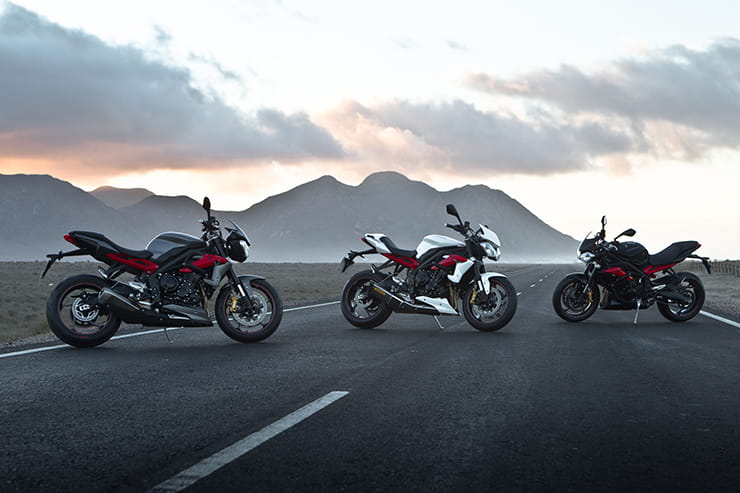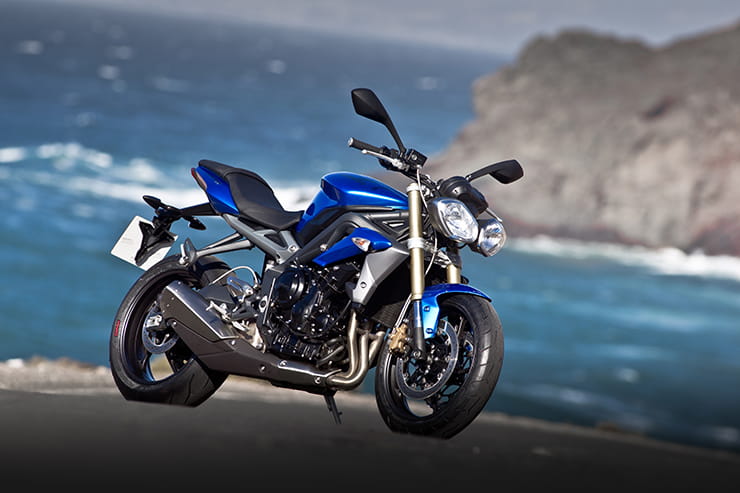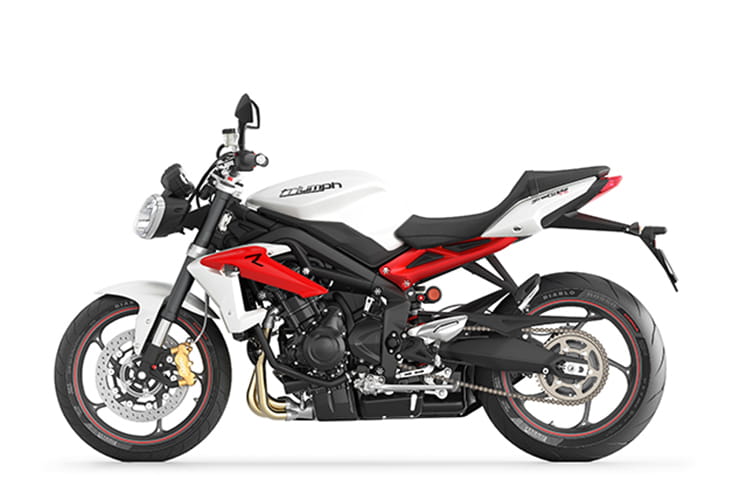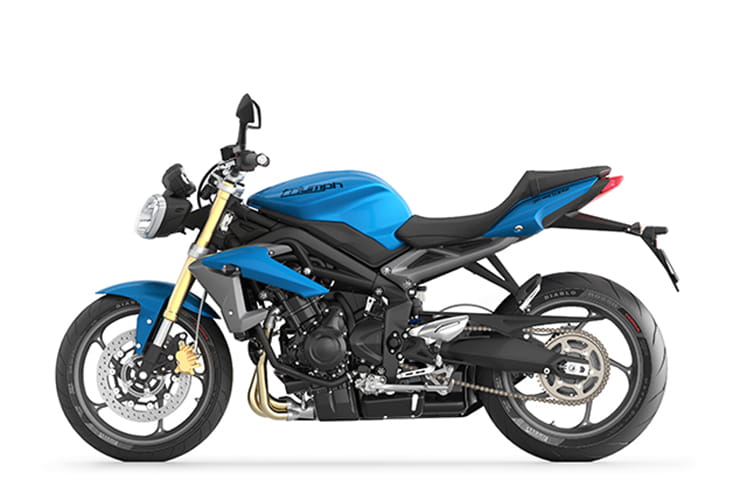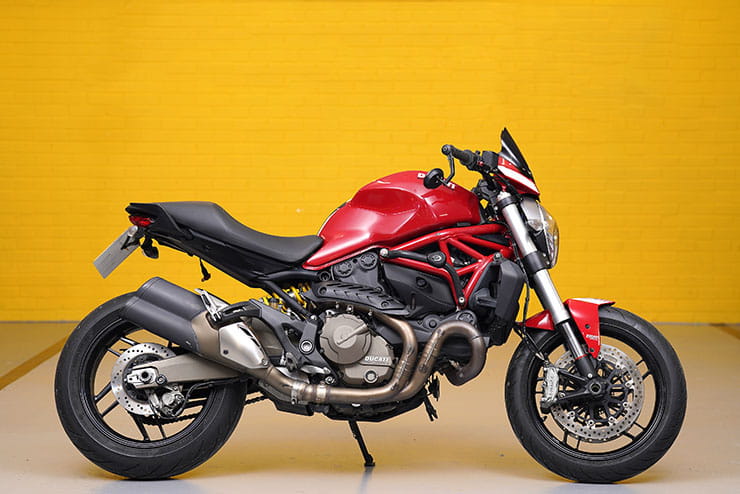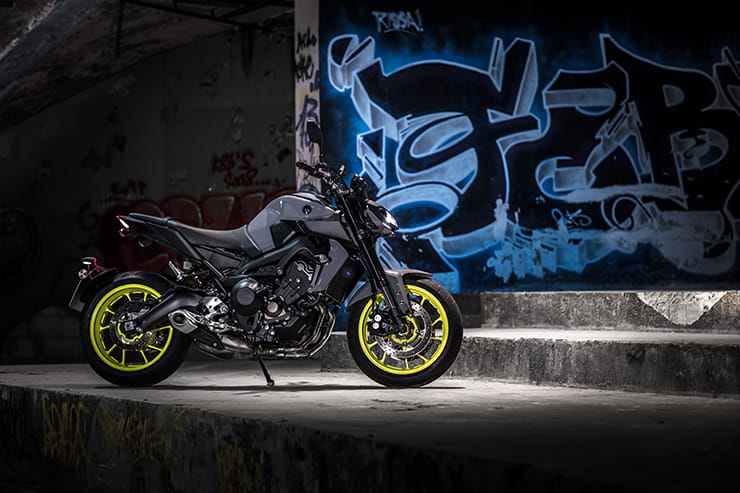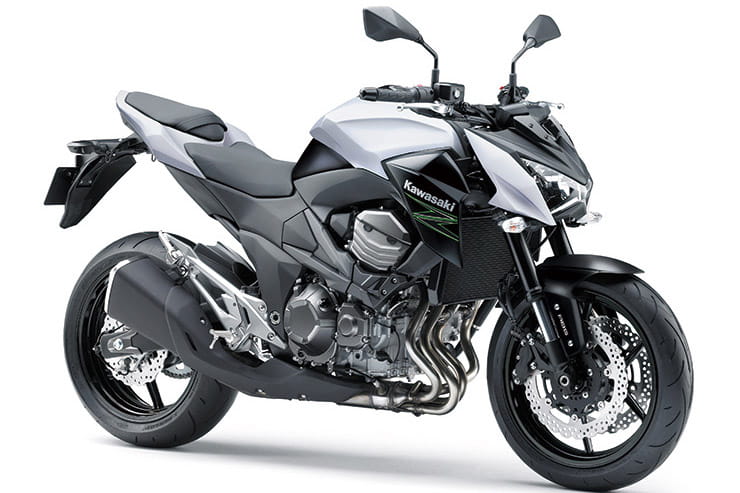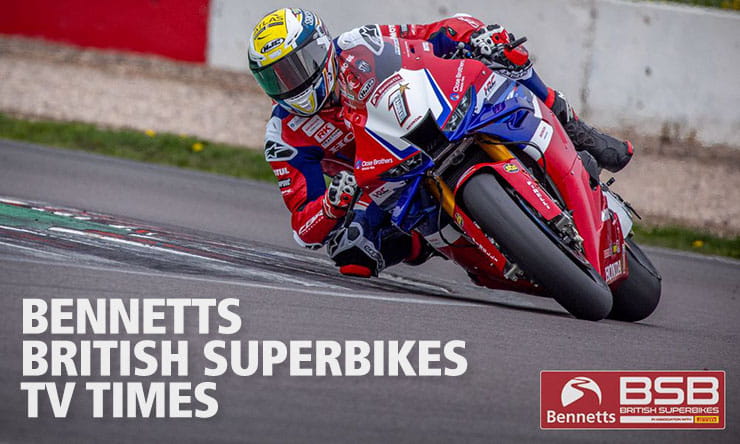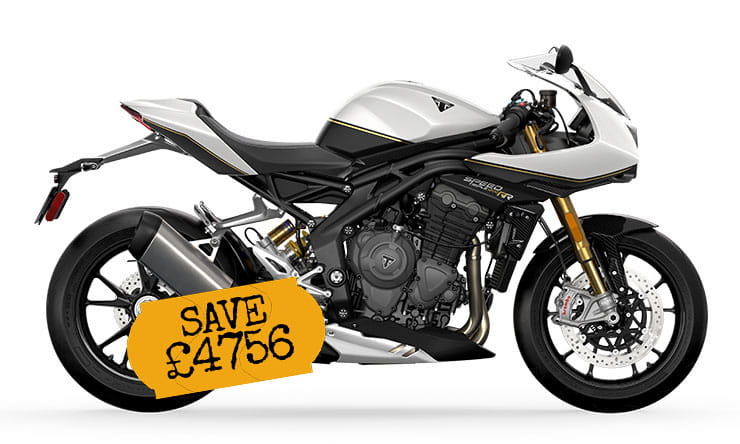Price: £4000-6000 | Power: 105bhp | Weight: 183kg | Overall BikeSocial Rating: 5/5
With the original Street Triple models (2008-2012) already dominating the middleweight class, in 2013 Triumph decided the time was right for a refresh – mainly as the Daytona 675 had already been replaced and the naked bike and sportsbike share a similar chassis. Featuring an all-new frame, a bit of modern tech in the shape of ABS and a slightly revised engine, the 2013 Street Triple and higher-spec Street Triple R weren’t ground-breaking models such as the first generation but they did move the game on enough to ensure they remained ahead of the competition. Although now replaced by the bigger-capacity, and far more tech-heavy, 765 versions, the older 675 Street Triple models remain simply outstanding bikes to ride and great used buys.
Triumph Street Triple and Street Triple R (2013-2016) Price
In 2013 the base model Street Triple cost £7349 (with ABS) and £8049 (again with ABS) for its higher-spec R sibling – talk about great value for money. Nowadays prices start at £4000 for a base bike with reasonable mileage with an R costing about £500 more. There are a few cheaper bikes out there but realistically, this is your price point. A late model base bike is £5500 area with an R about £6000. A few very low mileage R models are advertised for £7000 but that’s quite (very...) optimistic.
Pros & Cons
- Amazing handling
- Great motor
- Huge amount of fun to ride
- It’s quite pricey
- Lacking wind protection
- The 765 model is a bit better...
Engine and Performance
The Street Triple’s main draw has always been its triple engine and the second generation retains basically the same motor as before – almost... In the update Triumph actually extended the Street Triple’s first gear, removing a bit of the older (underseat pipe) model’s instant zap of acceleration in a move Triumph claimed was to help improve fuel economy. You only really spot it when you ride the two bikes back-to-back but do this and the new model does seem a little lethargic off the lights as a result. It’s not drastic, and a bit of a gearing change can always inject some more spirit, but it is worth noting nonetheless. Does it detract from ownership – not at all!
The 675 triple is a brilliant motor that has loads of mid-range and a rip-roaring top-end. Compared to the new 765 engine it certainly demands a few more revs but it is far from rev-happy and if you want to take it easy, it is more than happy to oblige. With a claimed 105bhp and 50ft.lb of torque (both the stock and R models share an identical engine) there is loads of power on tap, the fuel-injection is excellent (keep those throttle bodies balanced) and it is great to see that the exhaust system is stainless steel as standard, meaning it continues to look good and resist rust.
When buying used there are very few issues when it comes to the motor, aside from the odd sensor failing and the occasional noisy cam chain adjuster all is generally good. If the gearbox is a bit clunky (it is exaggerated with the optional quickshifter fitted) check the drive chain as a slack one can make it worse than normal but other than checking the 6000-mile service intervals (12,000 valve-clearance check) have been adhered to, all should be well in terms of the motor.
Triumph Street Triple and Street Triple R (2013-2016) Handling & Suspension
Starting with the differences between the stock and R model, the R comes with Kayaba suspension like the base bike but it has fully-adjustable units front and back where the standard model only has adjustable preload on its shock with its forks non-adjustable. Interestingly, the R also has a 20mm taller seat height and slightly more aggressive geometry. Added to these suspension upgrades the R comes with four-piston Nissin radial brakes where the base bike has two-piston sliding units. Both bikes’ ABS systems can be deactivated if you wish. So that’s the nitty-gritty, how do they feel to ride? Brilliant!
The old Street Triple models were always a fantastic-handling bikes and the updated 2013 models are even better thanks to their new frame. A perfect balance between agility and stability, a well-ridden Street Triple is almost impossible to beat on the UK’s bumpy A and B-roads and all the time its riders will be wearing a huge grin on their face. The suspension on both bikes is set perfectly for the UK’s roads but, as you would expect, the R model is slightly more composed thanks to its adjustability. And it is also more than happy to be taken on track where the stock bike can start to feel a touch soft and in need of its damping increased to suit harder riding and braking.
When buying used the main issue with Street Triples is, as always, the suspension linkages. Although Triumph state they should be regreased every 12,000 miles at the service, by the time some bikes get to this figure it can be too late. Work on a refresh and regrease every four years instead, it’s not a major job and easily done by a competent DIY mechanic if you have a suitable bike stand and a torque wrench. The head bearings and swingarm pivot point also like to be treated to grease more regularly than Triumph recommend. Other than a check for crash damage or attempted theft, all is usually good and the finish impressively high with corrosion not common at all.
Comfort & Economy
A lot of owners complain that the Street Triple’s seat isn’t very forgiving with comfort seats very popular additions and pillions will be annoyed that grab handles aren’t standard fitment – happily they can be bought as an accessory. A lot of owners also fit a small fly screen, which deflects a bit of the wind blast to give your neck an easier time.
Despite a revised ECU and that taller first gear, the Street Triple still isn’t great in terms of economy with 41mpg good going but figures far less frustratingly common.
Triumph Street Triple and Street Triple R (2013-2016) Equipment
Initially the Street Triple and Street Triple R were sold with switchable ABS as an option, however that quickly changed and most used bikes come with it fitted. Always check to be 100% sure if you really want ABS. In terms of tech that was the only significant advancement but it is worth noting that the 2013-onwards bikes also come with an immobiliser as standard fitment, something that is good to see as the original Street Triple is quite a theft-magnet. A few used bikes have developed issues with the immobiliser system, which is generally down to the antenna, so always check it recognises the key by turning the bike’s ignition on and off a few times. The dash has a built-in lap timer, which is cool, and can link to Triumph’s tyre pressure monitoring system.
When it comes to accessories, a lot of bikes have a race exhaust end-can fitted and Triumph dealers do have an ECU remap (for the Arrow can, which was Triumph’s official accessory) that sorts the fuelling out. Generally, this map will work with most aftermarket end-cans so is worth getting installed but ideally an individual remap from a competent dyno house is the best solution. There is also an official ‘plug and play’ quickshifter, which is cool.
Loads of used bikes have crash protection, tail tidies, belly pans, pillion seta covers and even small screens fitted. Bar-end mirrors are also popular and actually quite a good addition as the stock mirrors are a bit crap.
Who wants a Street Triple? Anyone! New or experienced, the Street Triple suits any kind of rider.
Ducati Monster 821 (2014-2020)| Approx Price: £4500-£8000
Power/Torque: 112bhp/65.8lb-ft | Weight: 197kg
Yamaha MT-09 (2013-2016) | Approx Price: £3500 - £6000
Power/Torque: 115bhp/65lb-ft | Weight: 188kg
Kawasaki Z800 (2013-2016) | Approx Price: £4000-£6500
Power/Torque: 113bhp/61.3lb-ft | Weight: 229kg
Triumph Street Triple and Street Triple R (2013-2016) Verdict
If you want a simply amazing middleweight, look no further than the Street Triple. Although slightly revvy when compared to the latest 765-engined model, the older 675 motor is still superb and the chassis every bit as agile. Ideally the R is the pick of the two models but the base bike is still a brilliant option if you want to save a few quid. Hard to fault and impossible not to absolutely love.
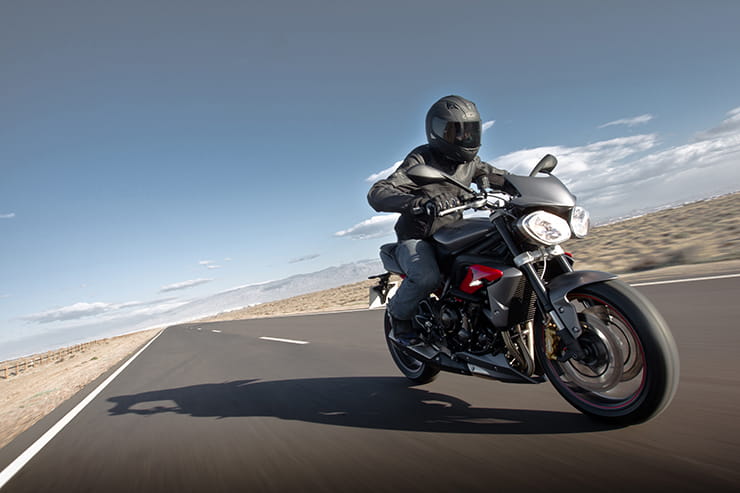
Triumph Street Triple and Street Triple R (2013-2016) – Technical Specification
|
Original price
|
£7349 (£8049 for R)
|
|
Current price range
|
£4000-£6000
|
|
Capacity
|
675cc
|
|
Bore x Stroke
|
74mm x 52.3mm
|
|
Engine layout
|
Inline triple
|
|
Engine details
|
12v, DOHC, liquid-cooled
|
|
Power
|
105bhp (78kW) @ 11,850rpm
|
|
Torque
|
50lb-ft (68Nm) @ 9750rpm
|
|
Top speed
|
140mph
|
|
Transmission
|
Six-speed, chain final drive
|
|
Average fuel consumption
|
42mpg
|
|
Tank size
|
17.4 litres
|
|
Max range to empty (theoretical)
|
165 miles
|
|
Reserve capacity
|
25 miles
|
|
Rider aids
|
ABS (optional initially)
|
|
Frame
|
Aluminium beam twin spar
|
|
Front suspension
|
Kayaba 41mm inverted forks
|
|
Front suspension adjustment
|
None (fully-adjustable on the R)
|
|
Rear suspension
|
Kayaba monoshock
|
|
Rear suspension adjustment
|
Preload (fully-adjustable on the R)
|
|
Front brake
|
2 x 310mm discs, Nissin two-piston calipers. (four-piston radial on the R). ABS
|
|
Rear brake
|
220mm disc, single-piston caliper. ABS
|
|
Front tyre
|
120/70 – ZR17
|
|
Rear tyre
|
180/55 – ZR17
|
|
Rake/Trail
|
24.1°/ 99.6mm (23.4°/ 95.0mm on R)
|
|
Dimensions (LxWxH)
|
2055mm x 740mm x 1060mm
|
|
Wheelbase
|
1410mm
|
|
Ground clearance
|
n/a
|
|
Seat height
|
800mm (820mm on the R)
|
|
Kerb weight
|
183Kg Wet
|
Looking for motorcycle insurance? Get a quote for this motorbike with Bennetts bike insurance



